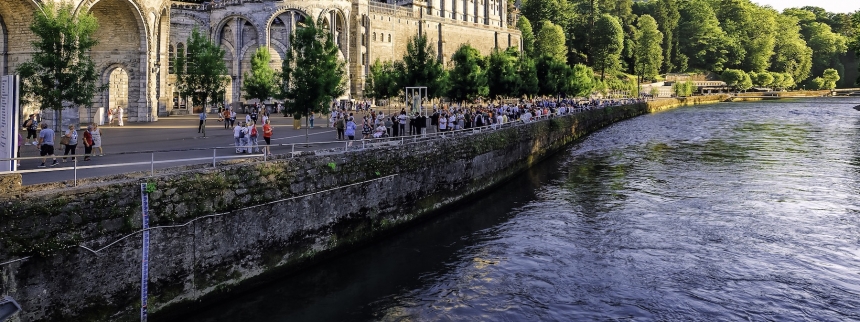
Today was cold and cloudy. There was no rain. This was welcomed. It made moving around the domaine more comfortable.
The river running through Lourdes was moving fast. It courses through the middle of the domaine passing in front of the Grotto. Three pedestrian bridges stitch one side of domaine with the other. The deep rushing sound of the river and the crisp gurgling of the Grotto spring speak a persistent encouraging word to any pilgrim attentive to their voices. Like the words in Psalm 19 about the language of creation, “There is no speech, no words; their voice is not heard; A report goes forth through all the earth, their messages, to the ends of the world,” the river and the spring remind us of what Jesus hopes to bring about in each of us. “The water I shall give will become in him a spring of water welling up to eternal life.” (Jn. 4.14) Moving water possesses a mysterious energy. Whether it is a river or a spring, life will flourish around it. The waters of Lourdes will do the same for anyone who is attentive to its fresh, invigorating, cascading cadence.
The pilgrims had two excursions on opposite sides of the river. In the morning the group walked reverently through the Grotto where the Virgin Mary appeared several times to Bernadette. The fountain is now shielded with plates of glass but one can still see the water bubbling up. Its splashing softly echoes through the Grotto.
Many pilgrims brought slips of papers with the supplications of friends and relatives for the maternal intercession of our Lady of Lourdes. These were quietly collected by a volunteer. Besides the spring uncovered by Bernadette, trickles of water flow from the surrounding rocks giving them a bright sheen. Drops of water would drip from the roof of the Grotto and plop on the ground.
In the afternoon, this band of pilgrims gathered for the Mass of the Anointing of the Sick during which all the malades were anointed with sacred oil following the ancient instructions of St. James. “Is anyone among you sick? He should summon the presbyters of the church, and they should pray over him and anoint [him] with oil in the name of the Lord.” (Js. 5.14)
Like the ceremony of the washing of the feet and the celebration of the Sacrament of Confession the day before, the anointing of the sick brings the minister and malade into close proximity. A particular relationship exists between the two sacraments of confession and the anointing of the sick. One essential dimension is the proximity between the minister and the disciple required by both sacraments. Whether the sick body or the sin-sick soul, both conditions can lead to a sense of alienation. Isolation from others is often the consequence. The consequence of the sacraments is reconciliation and communion. From both of these comes healing and strength.
The setting of both sacraments is often unadorned, without pretense. The power of both is found in the encounter of humble humanity. It is this experience of human weakness, whether physical, spiritual, or both, that creates the sacramental epiphany of divine mercy. As St. Paul said, “So we are ambassadors for Christ, as if God were appealing through us. We implore you on behalf of Christ, be reconciled to God.” (II Cor. 5.20) In both the Sacraments of Confession and Anointing, God heals; God reconciles; God strengthens.
This occasion of personally anointing the malades while they are in the midst of the Christian assembly also heals, reconciles, and strengthens the whole Church. The public witness provided on this special occasion in one of the chapels of Lourdes reflects what is true of all anointing and all confessions: the whole Body of Christ is healed. “If [one] part suffers, all the parts suffer with it; if one part is honored, all the parts share its joy. Now you are Christ’s body.” (II Cor. 12.26-27)
All the pilgrims, whether malades or companions, felt the joy of God’s mercy during the Mass of Anointing. God’s mercy flowed like a rushing river through the group. It was like a jubilantly jumping spring of life-giving water.
---
Did you miss a dispatch? Find them all here: First | Second | Third | Fourth | Fifth | Sixth

